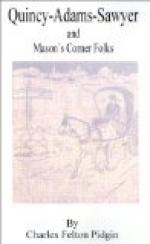When Dolly Gibson showed her mother the money that Miss Very had given her, at Alice’s direction, she was told to take it right back at once, but Dolly protested that she had earned it, and when her mother asked her to tell how, the child, whose memory was phenomenal, sat down and made her mother’s hair stand almost on end and her blood almost run cold with her recitals of the Eight of Spades, The Exit of Mrs. Delmonnay, and He Thought He Was Dead.
“They are immense,” cried Dolly, “they beat all the fairy stories I ever read!”
In due time another letter was sent to Mr. Sawyer, informing him that more books were needed, and that more chapters were ready, and on the morning of the last Sunday in June the young ladies were awaiting the arrival of Mr. Sawyer and Mr. Ernst.
The morning had opened with a heavy shower and the sky was still overcast with angry-looking, threatening rain clouds. Within the little parlor all was bright and cheerful.
Familiar voices were heard greeting Mrs. Gibson and the children, and men’s footsteps soon sounded upon the stairs. Leopold entered first, and, advancing to Rosa, handed her a large bouquet of beautiful red roses.
“Sweets to the sweet, roses to Miss Rosa,” said he, as he bowed and presented them.
“They are beautiful,” she exclaimed.
“All roses are considered so,” he remarked with a smile.
While this little byplay was going on, Quincy had approached Alice, who, as usual, was sitting by the window, and placed in her hand a small bunch of flowers. As he did so he said in a low voice, “They are forget-me-nots. There is a German song about them, of which I remember a little,” and he hummed a few measures.
“Oh! thank you,” cried Alice, as she held the flowers before her eyes in a vain effort to see them. “The music is pretty. Can’t you remember any of the words?”
“Only a few,” replied Quincy. Then he repeated in a low, but clear voice:
“There is the sweet
flower
They call forget-me-not;
That flower place on
thy breast,
And think of me.”
“Say, Quincy, can’t you come over here and recite a little poem about roses to Miss Very, just to help me out?” cried Leopold. “All I can think of is:
“The rose is red,
The violet’s blue—”
“Stop where you are,” said Rosa laughingly, “for that will do.”
Alice dropped the forget-me-nots, in her lap. The illusion was dispelled.
The newly-completed chapters were next read, and quite a spirited discussion took place in regard to the political features introduced in one of them. Dinner intervened and then the discussion was resumed.
Alice maintained that to write about Aaron Burr and omit politics would be the play of “Hamlet,” with Hamlet left out; and her auditors were charmed and yet somewhat startled at the impassioned and eloquent manner in which she defended Burr’s political principles.




